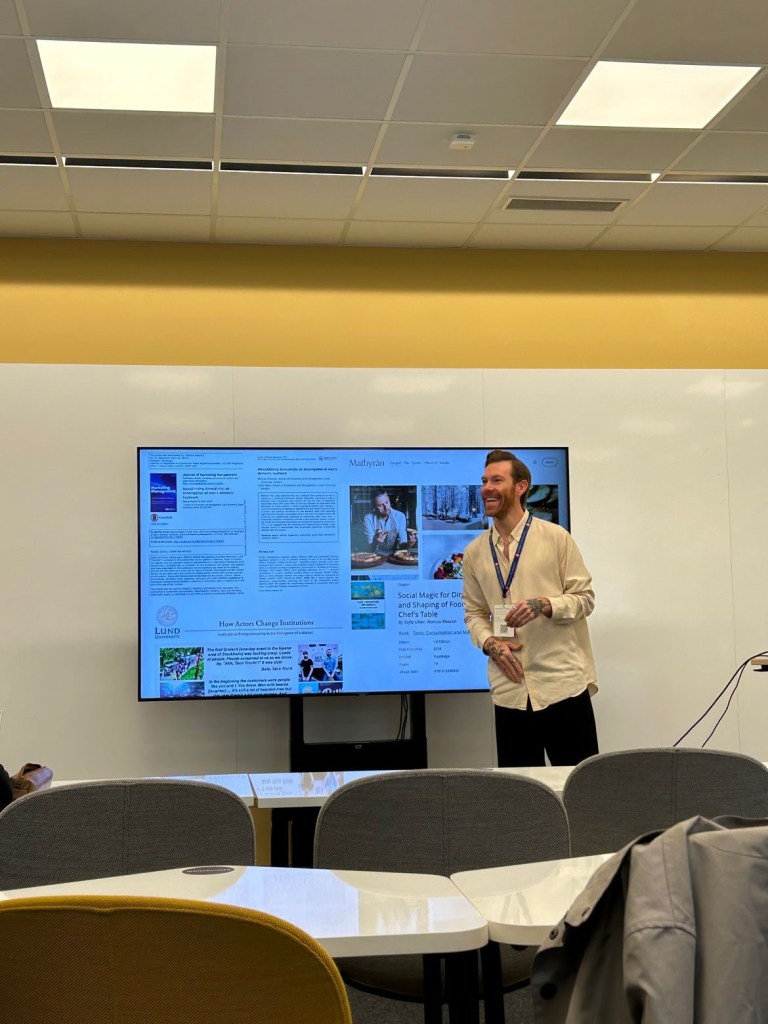Special Session accepted at the 2014 Consumer Culture Theory Conference in Helsinki. I will in cooperation with Susanna Molander (Stockholm University), Jakob Östberg (Stockholm University) and Sofia Ulver (Lund University) host the special session “What’s cooking? The different practices and meanings involved in the same consumption situation.”
Chair and Discussant
Dorthe Brogaard Kristensen, University of Southern Denmark
Cooking love: Mothering as a practice
Susanna Molander, Stockholm University, Sweden
Cooking men: The Gastrosexual practice of doing gender
Sofia Ulver, Lund University, Sweden
Marcus Klasson, Lund University, Sweden
Cooking to survive: Health practices in everyday cooking
Jacob Östberg, Stockholm University, Sweden
The practice perspective has recently invigorated theory building within the field of consumer culture theory by emphasizing the routinized aspects of consumption. These aspects have many times been overlooked by previous perspectives in the field that have focused more directly on aspects explicitly verbalized by consumers. We would argue, however, that the practice perspective has yet to reach its full potential. One of the weaknesses is that there has been relatively little discussion about how the definition of what constitutes a practice implicates the subsequent theory building. In this session we bring together three studies looking at the same consumption situation—namely cooking. It would be tempting to suggest, then, that we are studying the practice of cooking. We suggest instead that we are identifying three other practices that are entangled in the cooking situation, and that cooking is thus not necessarily a practice in itself but a consumption situation inviting a wide range of practices to take part of its offerings. By applying a practice perspective, our aim is to illuminate how radically different meaning making processes may take place around one and the same consumption situation. Thus, rather than looking at cooking as a particular practice in itself, governed by a fixed set of rules and regulations that consumers adhere to, we view it as a situation where different practices can be studied.
In Alan Warde’s (2005) version of practice theory consumption is rarely a practice in itself, but moments embedded in other practices with orientations towards certain ends that this consumption helps to accomplish. The approach hereby forces us to understand consumption through the logic of practices and makes it a point of departure to understanding the broader tacit social web of which consumption is a part. As a consequence the individual consumers are decentered and the practice as such becomes the focus of study. Thus, rather than focusing on the individual, it is the practice that organizes behavior and it is the practice that gives rise to perceived needs and wants. Consumers are mere carriers of the practice.
Our three papers look into how cooking can be part of distinctively different practices incorporating consumption in diverse ways to fulfill their ends. As consumers we are involved in an intricate web of multiple practices that guide our doings and sayings, including our thoughts and even emotions. Some of these practices might be more focused on a particular time and context bound activity, such as Nordic walking (Shove and Pantzar 2005). Other practices are vaguer, but still oriented towards certain goals that might serve as a higher order organizing many of the things we do, such as the practice of doing gender (cf. West and Zimmerman 1987) or the practice of capitalism (cf. Sewell 1992). Note, however, that we are not talking about dispersed practices not tied to any particular meaning and used across a range of areas of social life, but of complex forms of integrated practices, integrated primarily through a teleoaffective structure providing them with direction and meaning (Schatzki 1997).
We suggest that there is an hierarchy of practices that we engage in at each point in time and that some of these practices are such as described above, namely of a higher order – and what we call metapractices. These metapractices have the capacity to order the other practices that we are engaged in during a particular consumption situation. The three papers constituting this proposed session all use the context of cooking but identify three different metapractices at play. In paper 1 the author highlights how the metapractice of mothering use cooking as a way to express love and caring for others. In paper 2, the author brings forward how middle-class young men in an unusually gender equal part of the world use cooking to resist this leveling through the metapractice of doing gender. Finally, paper three looks at how the metapractice of doing health structures the entire cooking situation offering overarching goals that all other goals need to adhere to.











